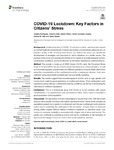COVID-19 Lockdown: Key Factors in Citizens’ Stress

Use this link to cite
http://hdl.handle.net/2183/29148Collections
- Investigación (FEDU) [938]
Metadata
Show full item recordTitle
COVID-19 Lockdown: Key Factors in Citizens’ StressAuthor(s)
Date
2021Citation
Rodríguez S, Valle A, Piñeiro I, González-Suárez R, Díaz FM and Vieites T (2021) COVID-19 Lockdown: Key Factors in Citizens’ Stress. Front. Psychol. 12:666891. doi: 10.3389/fpsyg.2021.666891
Abstract
[Abstract] Background: Confinement due to COVID-19 can have a short‐ and long-term impact on mental health (increased levels of stress and anxiety and emotional upheaval) and on people’s quality of life. Knowing what factors are behind the stress can benefit the development of strategies and resources for future situations of a similar nature. The purpose of this study is to examine the incidence of a series of sociodemographic factors, confinement conditions, and work situation on the stress reported by confined citizens.
Method: The sample is made up of 2008 citizens (19.9% men), the Perceived Stress Scale of 14 items (PSS-14) was used to assess the stress level of the population, as well as a sociodemographic questionnaire and different questions aimed at obtain information about the characteristics of the confinement and the employment situation. Data were collected using exponential snowball-type non-probability sampling.
Results: The results suggest that sociodemographic factors such as age, gender, and income level could be good predictors of confinement stress. Post-confinement work expectancy along with pre-confinement working conditions can be key to protecting the well-being of confined populations.
Limitations: This is a transversal study that forces us to be cautious with causal interpretations. The questionnaire was administered online, which means it excluded a good proportion of the population.
Conclusion: The perception of stress being higher in women than men, with the lowest stress in older people and those with higher reported incomes. Stress levels increase as populations spend more weeks in confinement and the pre-confinement work situation seems key to protecting the well-being of the population. A lower stress is observed among stable couples without children confined in residential or suburban areas. Low income or economic instability is associated with a higher rate of stress and anxiety. The results can contribute to prioritizing actions and aid by contributing to the formation of teams and the design of tools for work in the current pandemic situation.
Keywords
Health and well-being
Stress
COVID-19
Context effects
Survey research
Stress
COVID-19
Context effects
Survey research
Editor version
Rights
Atribución 4.0 Internacional






